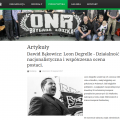Click HERE to read previous part of the series. Click HERE to see all chapters of the series so far.
Nonetheless, they don’t give up. A parliamentary commission investigating the case of Amber Gold, that serves only one purpose – to throw shit at Tusk in hope, that something will stick to him – summoned him again. I bet they really regret it now, as he is way above their league. While the commission chief Małgorzata Wasserman desperately tried to create an illusion that he is somehow morally responsible for the fact that people, who fell for Amber Gold scam, lost their life savings, relaxed Tusk openly mocked her and her colleagues and used every opportunity to criticize the government. Best moments of this deposition can be seen here: No wonder, that pro-PiS media started to panic. They realised, that if Tusk wanted to come back to Polish politics, they have nobody who would be able to match him. Hence, the scaremongering begins:[Nasza analiza] Pierwsze objawy paniki. pic.twitter.com/BxxPJU0rfn
— TVΠ Korea 🇰🇵 💯 (@tvpiKorea) 18 listopada 2018
(note how his hair are coloured red in one of the pictures: kids in Poland believe, that ginger people cannot be trusted – this is the level of discourse there).
Fast forward a week or so and I bet that Małgorzata Wasserman really regrets that she was going out of her way to lecture Tusk about prime minister’s personal responsibility to supervise activities of the Financial Supervision Authority. And not only because it was promptly pointed out, that FSA’s powers in controlling para-banking institutions were tied, because PiS was doing everything in its power to stop it into sniffing around SKOK saving societies, that for many years were abused by PiS members who syphoned money out of the system and funnelled it through some shady foundations abroad. The SKOK financial scandal is the true elephant in the room here.
But reminding everyone that what is going on in the financial world is the personal responsibility of the prime minister turned out to be catastrophic for PiS a few days after Tusk’s deposition. One of the richest Poles Leszek Czarnecki (no relation with PiS’ Ryszard Czarnecki) published a recording he made during a meeting with Marek Chrzanowski, a director of FSA back in March. The banks owned by Czarnecki are not doing great, and recent decisions of the FSA have put even more pressure on them, requiring Czarnecki to invest millions in them to keep them afloat. Chrzanowski offered Czarnecki a deal: if he employs a certain lawyer and pays him 40 000 000 zł, FSA will loosen the regulations, allowing Czarnecki’s bank to catch a breath and giving him time to restructure them. Chrzanowski will also prevent the plan to tighten the screw even further in order to enable the government to take over Czarnecki’s banks as failed ones for 1 zł. So basically this is one of the biggest corruption scandals ever: Czarnecki was given a choice: to pay 1% of what his bank is worth or to have it de facto stolen by the government. But this is only the tip of the iceberg. The case seems to be complicated and showing the scale of the PiS’ octopus, that feeds its tentacles into all aspect of the connections between business and a state. It also shows that this corruption scandal might be induced by a power struggle between prime minister Mateusz Morawiecki, who was not happy with having Chrzanowski as a chief of FSA, and chief of National Bank of Poland Adam Glapiński, member of Kaczyński’s inner circle. There are also some interesting side stories to it. It has emerged from that recorded conversation, that Grzegorz Bierecki, PiS senator and chairman of the Public Finances and Budget Commission, and the very men, who orchestrated syphoning money out of SKOK system, tried to deposit 70 000 000 zł in one of Czarnecki’s banks. Czarnecki refused, suspecting that that money might be in fact those syphoned out of SKOK and reported it to FSA. Nothing came out of it, probably because Chrzanowski, a protégée of Glapiński and supported by Grzegorz Bielecki, soon after taking up his post at FSA sacked all people, who were investigating SKOK scandal. Another aspect of the story is that after Czarnecki refused to employ Grzegorz Kowalczyk – the lawyer proposed to him by Chrzanowski, Kowalczyk ended up working for a bank belonging to one of the other Polish oligarchs, Zygmunt Solorz. In a strange coincidence, it was about this time, when Polsat, a TV station owned by Solorz, until recently considered to be one of the most neutral sources of information, begun to show a strange pro-government bias. Moreover, soon after Czarnecki went public with his accusations, the parliament voted in in the most urgent and chaotic (and not entirely legal) manner some amendments to the banking law, allowing that fallen banks can be taken over not only by government but also by other banks, thus making it possible for example for Solorz to take over Czarnecki’s financial empire. Due to Glapiński’s connections to the scandal, the National Bank of Poland also fell into the spotlight. It had emerged, that it does not do so great either. It ended the year with 2 500 000 000 loss, and it’s gold reserved are also valued significantly less. OK, some of its financial failures can be blamed for the general economic situation, but nobody knew how it is possible that despite the reduction in the number of employees, it had spent over 9 000 000 zł more on salaries. Until it had emerged that in order to celebrate Poland’s centenary celebrations, the vast majority of its employees were given 6 000 zł of “circumstantial bonus”. Adam Glapiński is nice not only to his own employees, though. It had emerged, that he recommended 30 years old Kacper Kamiński for a cosy job in World Bank in Washington. Kacper Kamiński’s dad, Mariusz, is a chief coordinator of secret services – you might remember him as the guy, who had been sentenced in the court of the first instance for a significant jail time for abusing his position during PiS’s previous time in power. But he was so important for PiS, that president Duda pardoned him without even waiting for the final verdict, thus breaking constitution. Kacper’s mom has also been employed by Glapiński – she is a chief of one of the departments in the Polish National Bank. Mariusz Kamiński refutes all accusations of nepotism, threatening to sue anyone who makes such suggestions. I don’t want to be sued, so I just stick to the facts here:- Marek Chrzanowski, Glapiński’s man, is accused of one of the biggest corruptions acts in Polish history.
- The investigation is then supervised by the chief of special services Mariusz Kamiński, who’s family members either work for Glapiński or have been recommended for a cosy job by him.
- Marek Chrzanowski was in Singapore when the shit hit the fan. He is ordered back to Poland but he is not arrested at the airport. Instead, he goes to his office and spends significant time there. Special service agents enter his office to search it and seize some documents few hours after he left. His house has been searched even later.
- For comparison: a man accused of dressing Lech Kaczyński’s statue in a T-shirt with the word “constitution” on it had his house raided by the police the next morning just after 6 am.
This piece was written for Britske Listy Photo: Public Domain via piviso.com





